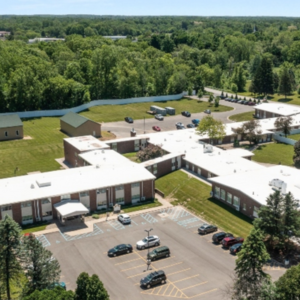Recovery-Oriented Systems of Care – Limelight Interview

Alec Green, at the Sanford Admissions & Outreach Center
A recovery-oriented system of care (ROSC) is an infrastructure with the resources to address the full range of substance use problems within communities. The ROSC provides a continuum of care, working together with mental health and primary care resources. This includes prevention, early intervention, various treatment programs, continuing care, and long-term recovery.
Recovery-Oriented Systems of Care
Within a ROSC, there is a menu of services. At Sanford, these services are individualized, person-centered, and are performed within a defined network. Similarly, the goal is to provide those seeking help and their families with the tools they need to make educated decisions about the level of care necessary for the best outcomes in recovery.
One of the important aspects of a ROSC is the participation of those in recovery, their families, and the community in the recovery process. The subject of our Limelight Interview, Alec Green, is uniquely qualified to fill the role of Managing Director at Sanford, and to spearhead ROSC innovations within the company. Alec has served just about every role within the organization. From managing the restoration of the men’s facility, Sanford House at John Street, to spearheading payment models and helping our clients navigate all aspects of their Sanford experience. He even got his hands dirty (literally), planting bushes on the grounds of Sanford properties.
A ROSC provides the best outcomes. If we understand a person’s background and specific needs, we can better treat their substance use disorder and any underlying comorbid issues. And successful outcomes happen when a person begins treatment in the correct place on the continuum of care.
Alec Green, Managing Director Sanford Addiction Treatment Centers

Learning the business from the ground up. The front lawn – Sanford House at Cherry Street for Women
SH – What does your job as Managing Director entail?
Alec – Over time, my job has morphed in many ways. (So have I.) But my main focus is assisting the operations staff on a day to day basis. I also spend time creating different opportunities with payors, to reduce the barriers to entering treatment. Sanford has secured 14 in-network contracts with private insurers who provide coverage throughout Michigan.The strategic decision to engage as many payors as possible was made to reduce costs for members and allow easier access to treatment. One of the primary barriers to entering treatment is cost. The bottom line is that I work with payors, employers, and ultimately individuals in our care, to create better treatment models. (Laughs) Plus a bit of everything else on top of that.
SH – What makes for effective treatment?
Alec – A recovery oriented system of care (ROSC). In other words, programs that are easily accessible, welcoming, and effective. As well as those programs that involve people in recovery, their families, and the entire community. I work to continually improve access to and quality of services at Sanford. Transparency. Individualized treatment – if we understand a person’s background and specific needs, we can better treat their substance use disorder and any underlying comorbid issues. And successful outcomes happen when a person begins treatment in the correct place on the continuum of care.
SH – What is the key to success in recovery?
Alec – There are three important pieces to recovery success. First, family involvement (however “family” is defined) to provide a support system. Second, a relationship with a therapist who is committed and passionate in working with you. And third, where needed, psychotropic drugs and medication-assisted treatment (MAT).
SH – What about the pitfalls?
Alec – Lack of support. No support or negative influence on a person’s recovery or their MAT program.

Sanford’s John Street facility – restored from the cobblestones to the roof.
SH – What would you describe as the fun part of your job?
Alec – I love being able to work with a passionate, creative, and energetic staff! Our staff is what makes the treatment at Sanford so special. That energetic and creative team is the reason we were able to sustain ourselves during a pandemic, creating viable telehealth programs and adhering to state and federal regulations.
SH – How do you envision Sanford after the pandemic?
Alec – It will be a stronger organization. By that, I mean we will be able to serve those who need help at our full capacity. And through outpatient programs and telehealth we will be able to reach those we probably could not have served before. Interestingly, many of those diagnosed with COVID-19 seek psychological services within 90 days of their diagnosis. So there is a whole new population of people to help.
SH – What challenges you?
Alec – Trying to keep up and stay current, on a national level, with all aspects of substance use disorder treatment.
SH- Do you read for pleasure?
Alec – I just bought Obama’s new book, A Promised Land, but I haven’t had a chance to read it yet. I am caught up in news on mental health, so I read things like the New England Journal of Medicine, MiBiz, and Wall Street Journal.
SH – What is your favorite journey?
I’m on it! I started working full time at Sanford 4 1/2 years ago and I love what I do. I think about it all the time, and continue to try to better myself and the areas of the organization I impact every day.
SH – Do you have a motto?
Yes! It’s another day of opportunity.
Sounds like words to live by. Thanks Alec.



